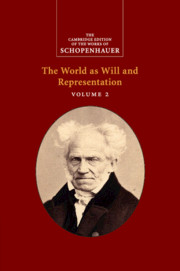Chapter 50 - Epiphilosophy
Published online by Cambridge University Press: 30 June 2022
Summary
The conclusion of my discussion might be the place for a few observations concerning my philosophy itself. – As I have already said, my philosophy does not presume to explain the ultimate grounds for the existence of the world: rather, it sticks to the facts of outer and inner experience, as they are accessible to everyone, and establishes the true and most profound connection between them, but without ever actually going beyond these to any otherworldly things and their relations to the world. It therefore does not reach any conclusions concerning whatever might exist beyond all possible experience, and instead simply provides the interpretation of what is given in the external world as well as in self-consciousness; it is thus content to grasp the essence of the world according to its inner connection to itself. So it is immanent, in the Kantian sense of the word. For this very reason it leaves many questions unanswered, in particular, the question of why what has been factually established is as it is and is not otherwise, etc. But every such question, or rather every answer to it, is in fact transcendent, i.e. it cannot be thought using the forms and functions of our intellect, it cannot be resolved into these forms and functions: our intellect is to these questions what our sensibility is to properties of bodies for which we have no sense organs. And so for instance, after all of my arguments, one can still inquire from where has this will arisen that is free to affirm itself (the appearance of this being the world) or to negate itself (an appearance of what we do not know)?What is the fatality that lies beyond all experience, and that has put the will in the highly precarious dilemma of either appearing as a world governed by suffering and death or of negating its ownmost being? Or in fact what could have induced it to leave behind the infinitely preferable peace of blissful nothingness? An individual will, one might add, brings about its own ruin through mistaken choices alone, and so through the fault of cognition: but as for the will in itself, prior to any cognition, and consequently still lacking cognition, how could it go wrong and end up in its current state of ruin?
- Type
- Chapter
- Information
- Schopenhauer: The World as Will and Representation , pp. 657 - 663Publisher: Cambridge University PressPrint publication year: 2018



